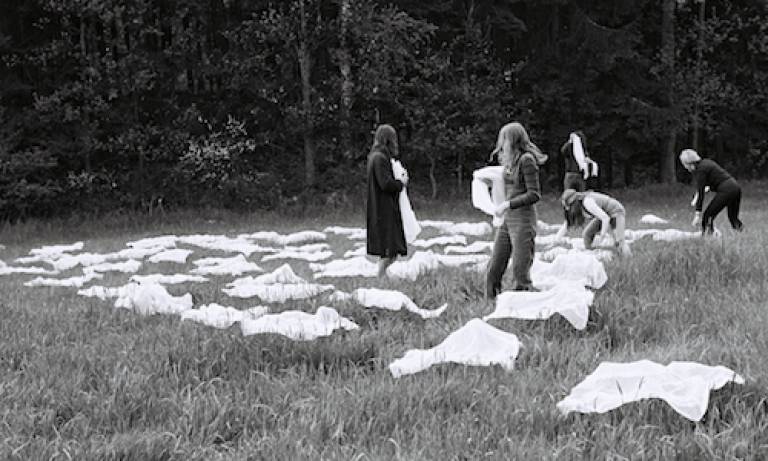Protest - Performativity - Post-Truth: The Legacy of 1968
15 November 2018, 10:00 am–5:00 pm

Event hosted by the Czech Centre London, the UCL European Institute, the UCL FRINGE Centre, and the UCL Institute of Advanced Studies.
Event Information
Open to
- All
Availability
- Yes
Organiser
-
UCL European Institute
Location
-
IAS ForumWilkins Building, South WingGower StreetLondonWC1E 6BT
With its three main panels – Protest and Performativity; Gender and Dissent; and Living in Post-Truth – this symposium invites academics, artists and activists to explore the legacy of the 1968 Prague Spring and other global resistance movements through the perspective of art theory, gender, performativity and post-truth politics.
The ‘performative turn’ affecting the study of culture towards the end of the 20th century placed a new emphasis on the production, processes and reception of cultural phenomena. In the intervening decades, however, performativity has taken on dimensions previously inconceivable. Political protest has traditionally aimed at communicating the truth of its message — but what happens when performativity itself has displaced any notion of truth? This symposium will address this question through consideration of the history of protest as performance, starting from Iron Curtain dissidence — and Václav Havel’s famous injunction to ‘live in truth’ — through the democratic convulsions of recent years, which often took direct inspiration from the Changes of 1989, to the current predominance of untruth and affect in political dynamics.
Event hosted by the Czech Centre London, the UCL European Institute, UCL Fringe Centre, and the UCL Institute of Advanced Studies
Part of #czech100, a festival of exciting cinema, theatre, visual arts, design and music celebrating the Czech Republic’s centenary (28 October - 9 December 2018), as well as the Czech Centre’s #CzechAndSlovakCentury series.
In partnership with the Austrian Cultural Forum London, Embassy of Lithuania in London, and Embassy of the Czech Republic in London.
10:00 am to 7:00 pm, 15 November 2018
Programme
10.15-10.30: Welcome and Introduction
10.30-12:00: Panel I: Protest and Performativity
Explores how the need to catch and hold attention brings protest into the orbit of artistic expression in general and theatricality in particular. Consideration of performance both as utterance and as silence; as positive expression, manipulation and censorship.
Speakers:
Natalia Koliada, Founder and artistic director of Belarus Free Theatre
Dr Klara Kemp-Welch, Lecturer in 20th Century Modernism at The Courtauld Institute of Art
Dr Paul Clarke, artist, theatre director and Senior Lecturer in Performance Studies at University of Bristol
Chair: Dr Peter Zusi, Associate Professor in Czech and Comparative Literature, UCL School of Slavonic and East European Studies
12.00-12:45: Lunch
12.45-13:00: Film Screening: Banned Films I
13:00-14.30: Panel II: Hidden Histories: Gender and ProtestExplores how gender dynamics have shaped, and sometimes divided, movements of dissent both currently and historically (e.g., overlooked role of women in Iron Curtain dissent; the ‘de-silencing’ in #MeToo).
Speakers:
Irene Aristizabal, curator and head of exhibitions at Nottingham Contemporary
Cedric Fauq, curator, writer and co-founder of Clearview
Ivanka Lefeuvre, psychologist, Czechoslovak dissident, Charter 77 signatory
Libora Oates-Indruchová, Professor of Sociology of Gender, University of Graz
Chair: Rosie Cooper, Head of exhibitions at De La Warr Pavillion
14.30-15:00: Coffee break/ Film Screening: Banned Films II
15.30-17:00: Panel III: Living in Post-Truth
Examines how the sort of truth claims that any meaningful protest must raise might respond to a socio-political environment in which truth no longer occupies the privileged regulatory position it has traditionally held.
Speakers:
Dr Thomas Stern, Senior Lecturer, UCL Philosophy
Giedrius Sakalauskas, director of NGO “Res Publica” and civic activist (elf) coordinating cyber-resistance movement
Dr Uta Staiger, Executive Director, UCL European Institute
Chair: Dr Tim Beasley-Murray, Senior Lecturer in European Thought and Culture, UCL School of Slavonic and East European Studies
 Close
Close

